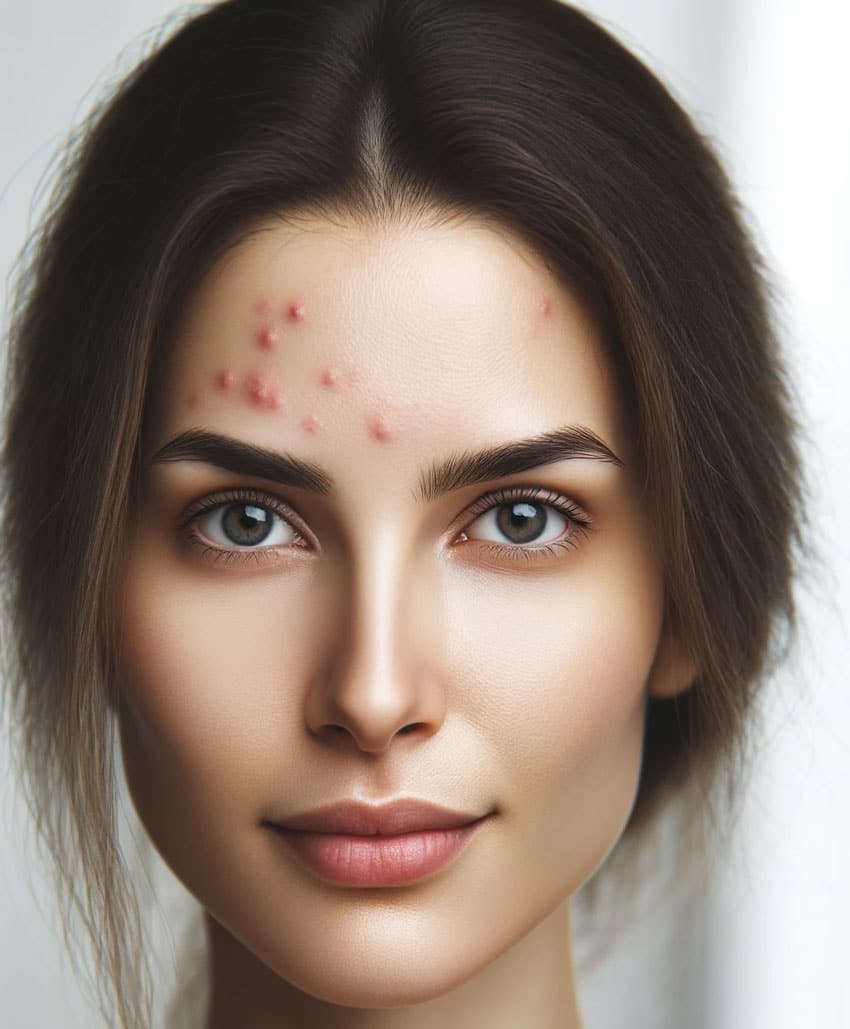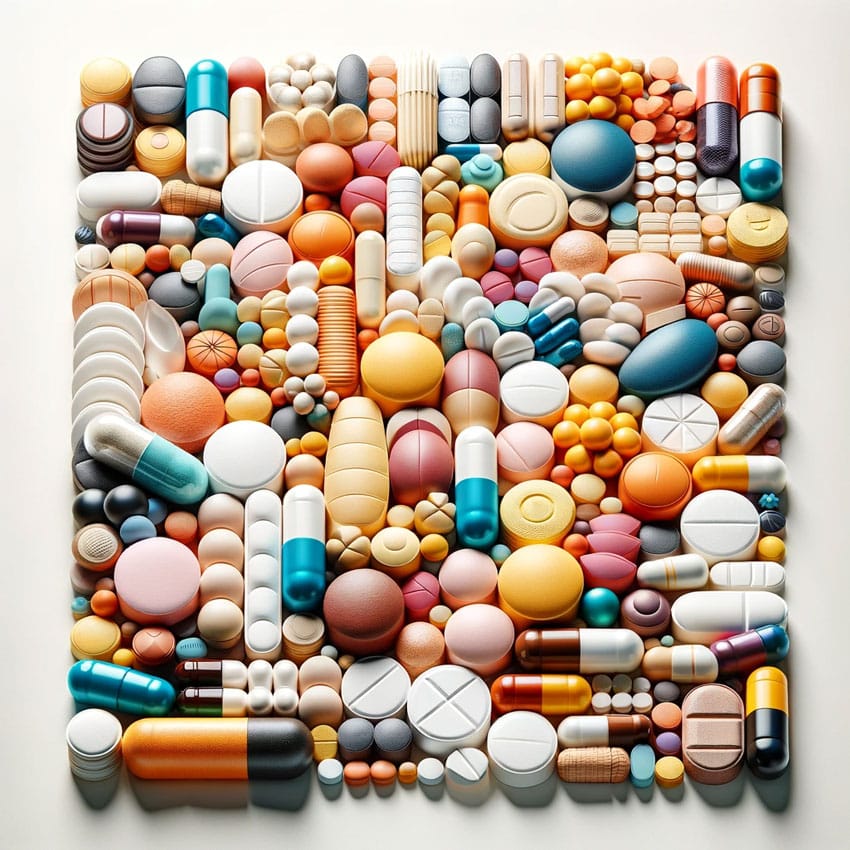We delve into the complex relationship between hormonal birth control and skin health. Often overshadowed by its primary function, the impact of birth control on acne is a subject shrouded in myths and misconceptions.
This article aims to demystify this relationship, drawing on the latest scientific research and insights from leading dermatologists and gynecologists.
We explore how various forms of hormonal contraceptives can influence skin conditions, particularly acne, providing readers with a clearer understanding of what to expect when considering birth control for skin health.
Understanding Hormones and Acne
Hormonal fluctuations significantly influence the development and severity of acne. This section explores how hormones, particularly androgens, impact the skin condition through changes in sebum production and pore behavior.

Role of Androgens in Acne
Androgens are hormones that increase in levels during puberty and can cause oil glands to enlarge and produce more sebum.
Testosterone is an androgen that’s intimately linked with acne development. It stimulates the oil glands that are found beneath the skin, which can lead to increased oiliness and the potential for pores to become clogged.
Hormonal Acne and Females
For females, hormonal acne is often associated with fluctuations in hormones such as estrogen and progestin. It tends to occur around menstrual cycles, during pregnancy, or with conditions such as polycystic ovary syndrome (PCOS).
The irregular hormone levels can exacerbate or trigger acne outbreaks in adult women, a phenomenon distinct from the hormonal acne observed in adolescents.
Impact of Hormones on Sebum and Pores
Hormones not only govern the production of sebum but also affect the shedding of cells lining the pores.
Excessive sebum and irregular shedding contribute to the clogging of pores, creating an optimal environment for acne. When pores are blocked, it can result in blackheads, whiteheads, and inflammation, leading to the red, swollen bumps characteristic of acne.
Birth Control Pills as Acne Treatment
Birth control pills are often used effectively as a treatment for acne. This approach utilizes the hormonal influence of oral contraceptives to mitigate acne symptoms.

FDA-Approved Birth Control for Acne
The FDA has approved several combination birth control pills for the treatment of acne. These include:
- Ortho Tri-Cyclen, which contains norgestimate and ethinyl estradiol.
- Yaz, with the active ingredients drospirenone and ethinyl estradiol.
- Estrostep FE, which includes norethindrone acetate and ethinyl estradiol.
These oral contraceptives are specifically recognized for their efficacy in acne treatment.
How Birth Control Pills Reduce Acne
Birth control pills typically combat acne by balancing hormones, specifically by reducing the levels of androgens in the body. Elevated androgen levels can cause excess sebum production and clogged pores, which lead to acne.
The contents of combination birth control pills, estrogen and progestin, work together to:
- Decrease overall androgen production.
- Lower the amount of sebum the skin produces.
- Reduce the likelihood of clogged pores.
Efficacy of Different Birth Control Pills
The effectiveness of birth control pills for acne will vary based on the individual’s response and the specific formulation of the pill.
Yaz and Ortho Tri-Cyclen have been found to be particularly effective due to their focus on combating hormonal fluctuations that can contribute to acne.
However, the benefits of birth control extend beyond just treating acne; they also include the regulation of menstrual cycles and the reduction of menstrual cramps.
While most oral contraceptives can have a positive effect on acne, patients should consult their healthcare provider to determine the most appropriate choice for their specific condition.
Potential Side Effects and Risks
Deciding to use birth control for acne treatment involves understanding various side effects and health risks. These ramifications can range from mild nuisances to serious medical concerns.

Common Side Effects
Birth control pills have a list of common side effects that many women may experience. These include:
- Nausea: This can often be reduced by taking the pill with food.
- Headaches: A side effect that typically decreases over time.
- Bleeding between periods (spotting): Usually temporary as the body adjusts to the hormone levels.
- Mood changes: Some individuals may experience emotional effects.
Long-Term Health Risks
Long-term use of hormonal birth control has been associated with several more serious health risks:
- Blood clots and stroke: Particularly in smokers or women over 35.
- Heart attack: Increased risk depending on one’s medical history and lifestyle behaviors.
- High blood pressure: Monitoring is recommended for those with a history of hypertension.
- Liver disease: Rare, but a potential risk that should be considered.
- Cancer: Some studies suggest a link to certain types of cancer, though this remains a complex and debated area.
Considerations Before Starting Birth Control
It is important to consider one’s personal and family medical history when choosing to use birth control for acne treatment. A medical professional should review risks such as:
- Personal or family history of blood clots or heart attack.
- Previous adverse reactions to hormonal treatments.
- Potential interactions with other medications.
Understanding these factors can aid in making a more informed decision regarding the use of birth control for managing acne.
Alternative Acne Treatments
While birth control is a known option for controlling hormonal acne, there are various alternative treatments available that target both inflammatory and noninflammatory acne. These options can be categorized into oral and topical medications, lifestyle changes and home remedies, and professional dermatological treatments.
Oral and Topical Medications
Oral medications for acne often include antibiotics, which can help to reduce inflammation and bacteria on the skin. However, antibiotics are generally recommended for short-term use to minimize the risk of antibiotic resistance.
Another powerful oral medication is isotretinoin, typically used for severe acne due to its ability to decrease oil gland size and lessen acne over time.
In terms of topical treatments, options like retinoids and benzoyl peroxide are widely recognized. Retinoids, derived from vitamin A, help to promote skin cell turnover and prevent clogging of hair follicles.
Benzoyl peroxide works by killing bacteria and removing excess oil and dead skin cells. Additionally, azelaic acid serves as a topical antimicrobial solution that can reduce inflammation and help clear the skin.
Patients must understand these topical treatments can cause dryness or irritation, especially when first starting the regimen.

Lifestyle Changes and Home Remedies
Patients may also explore lifestyle changes and home remedies as part of their acne treatment plan.
Consistent use of gentle cleansers targeted for acne-prone skin can help to remove excess oil and dirt. It’s also recommended to integrate non-comedogenic or oil-free products to avoid clogging pores.
Implementing a diet lower in refined sugars and dairy products can potentially reduce acne flare-ups.
Moreover, maintaining hydration, reducing stress through mindfulness or yoga, and ensuring adequate sleep are pivotal for overall skin health.
While these strategies might not eliminate acne, they can complement medical treatments by improving overall skin condition and reducing acne severity.
Professional Dermatological Treatments

For individuals seeking more intensive treatment, professional dermatological interventions can be considered.
A dermatologist can provide services such as laser therapy, which helps to reduce acne lesions and improve skin texture.
Corticosteroid injections may be utilized for large, painful acne cysts, offering rapid relief and reducing the risk of scarring.
Other advanced treatments include chemical peels and microdermabrasion, which help to exfoliate the skin, unclog pores, and improve the efficacy of topical treatments.
It is crucial for patients to discuss these options with their dermatologist to determine the best course of action based on the severity and type of acne they are experiencing.
Managing Expectations and Health Monitoring
In addressing acne with birth control, understanding the trajectory of treatment and the importance of health monitoring is essential. Choices and changes should be clinically informed to optimize outcomes.
Regular Consultations and Adjustments
Patients should maintain regular consultations with their dermatologist to assess the effectiveness of their birth control prescriptions in managing acne.
These check-ins are crucial for evaluating whether an adjustment in dosage or a change in medication is necessary, taking into account fluctuations in sebum production and androgen levels which could be influenced by the menstrual cycle or pregnancy.
Monitoring Side Effects and Efficacy
An ongoing evaluation of both the benefits and potential side effects is important for a well-rounded treatment plan.
Patients should be aware of their body’s responses and report any concerns to their healthcare provider.
The American Academy of Dermatology suggests monitoring changes in:
- Acne improvement
- Mood fluctuations
- Weight changes
Lifestyle Factors and Birth Control
The impact of lifestyle factors such as stress and smoke exposure on acne and birth control efficacy must not be overlooked.
Patients are advised to:
- Maintain a healthy lifestyle
- Manage stress levels
- Avoid smoking
These actions support the overall treatment strategy and can influence the effectiveness of birth control in managing acne.

